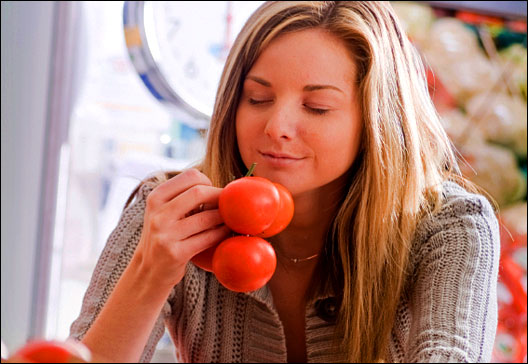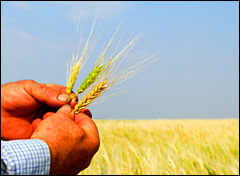sustainable agriculture
-
The toll of agriculture and hundred-year rains on Wisconsin’s farmland
We are, for better or worse, part of the land we live on. We can choose to extract as much as possible from the earth around us, the "Manifest Destiny" (or nature's in my way) line of thinking. Or we can take as little as necessary and leave as small a trace as possible, the "Seventh Generation" concept of the Native American peoples. If farming well were easy and profitable, everyone would be doing it. Farming is never easy, no matter how you go about it, but at least when we farm with nature it's not a 24/7 battle.
-
When will the conscientious burrito giant pay up for less exploitative tomatoes?
Tomato pickers in Florida: To earn $50, fill and carry 125 buckets. Photo: Coalition of Immokalee Workers. Chipotle Grill has received a lot of good press over its efforts to support local food systems in the areas where it operates. Even I’ve gotten into the act. In a post back in March, I reported on […]
-
Thoughts from the big organic confab in Boulder
Attending last week’s Organic Summit, held within the tasteful confines of the St. Julien Hotel and Spa in Boulder, was a very, well, organic experience. It started with the hotel itself. The St. Julien, a human-scale building right in downtown Boulder, exudes calm. The lobby, a light, airy space overlooking a sun-dappled garden with mountain […]
-
How the organic movement can regain its relevance
Buying organic makes you feel good … but does it make you think? On June 25, I spoke at the Organic Summit in Boulder, Colo., to an audience consisting largely of people who work in the organic food industry. This column is an adapted version of my talk. In his wildly popular satirical blog Stuff […]
-
The costs of unsustainable agriculture
Here's a guest post from Rodale Institute CEO Tim LaSalle.
-----
Tom Philpott is right to highlight the tremendous ecological debt we've built up by depending on nitrogen fertilizer to run our crop production system. Depending on mined and fossil-fuel produced nitrogen for our food is no more sustainable than depending on peaking oil and mountain-top removed coal for our energy.
There's no more "cheap" food and fuel, because, really, there never was. The huge irony -- currently obscured by the psychological jolt of widespread shortages of food and fuel -- is that we were just learning of how not cheap industrial food has been:
-
The good, bad, and ugly in our national five-year agricultural plan
We've all noticed higher grocery bills, but did you know Congress passed a $307 billion farm bill in late May that has a much bigger impact on what you will eat for dinner tonight than what you chose to place in the grocery cart?
The farm bill has a hand in all that happens before the swallow. The bag of Tyson chicken wings (grain subsidies), gallon of Horizon Organic milk (forward contracting), and pound of Fuji apples (country of origin labeling) are all regulated in some fashion by this policy determining how our food is raised and who profits.
But does the massive legislation support family farmers? Increase food access in urban food deserts? Or feed the 40 million poor and hungry in the United States?
Yes and no.
-
To create a truly sustainable food system, we’ll have to confront the farm-labor crisis
When I think about what a truly healthy, vibrant food system would look like, I envision more farms: small farms serving specific communities, and diversified, midsized farms geared to supplying their surrounding regions. Many hands make site work. Of course, there would still be interstate and global trade — you can’t grow olives or coffee […]
-
An NC farmer makes the radio
Listen Play the interview One of my favorite things about small-scale farming has been meeting other small-scale farmers. In short, you’ve got to be a bit of a character to decide to spend your days playing in the dirt while also trying to squeeze a living out of it. Gallows humor is a typical characteristic, […]
-
Why that organic label on your milk doesn’t tell the whole story
Tastes great, but who’s paying the health-care bills? As a writer, one of my goals is to demystify farming for non-farmers — to remind people that their food comes from somewhere, grown by someone, often drawing down finite resources. Less than 2 percent of Americans farm, yet all of us eat. Whether you’re scarfing a […]


